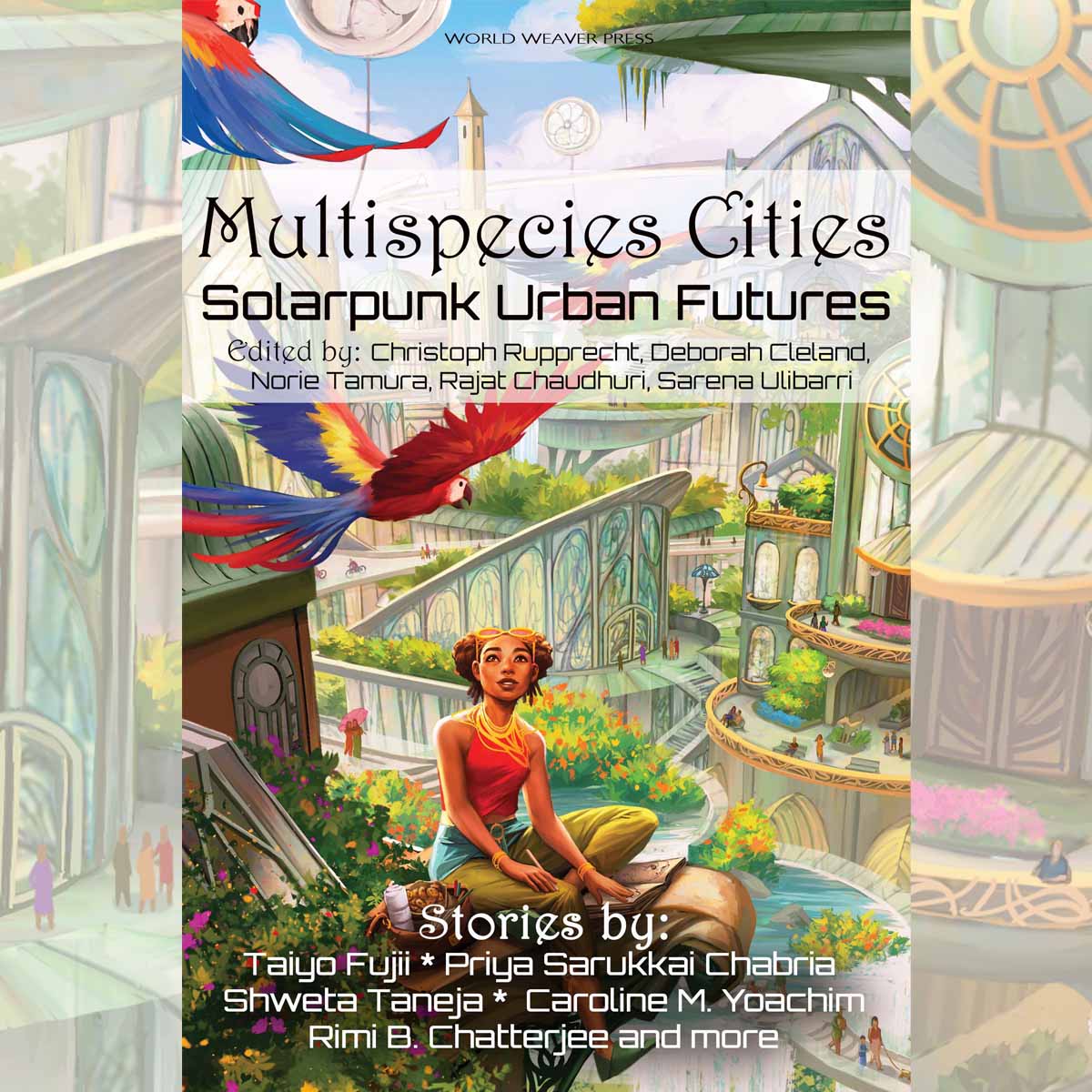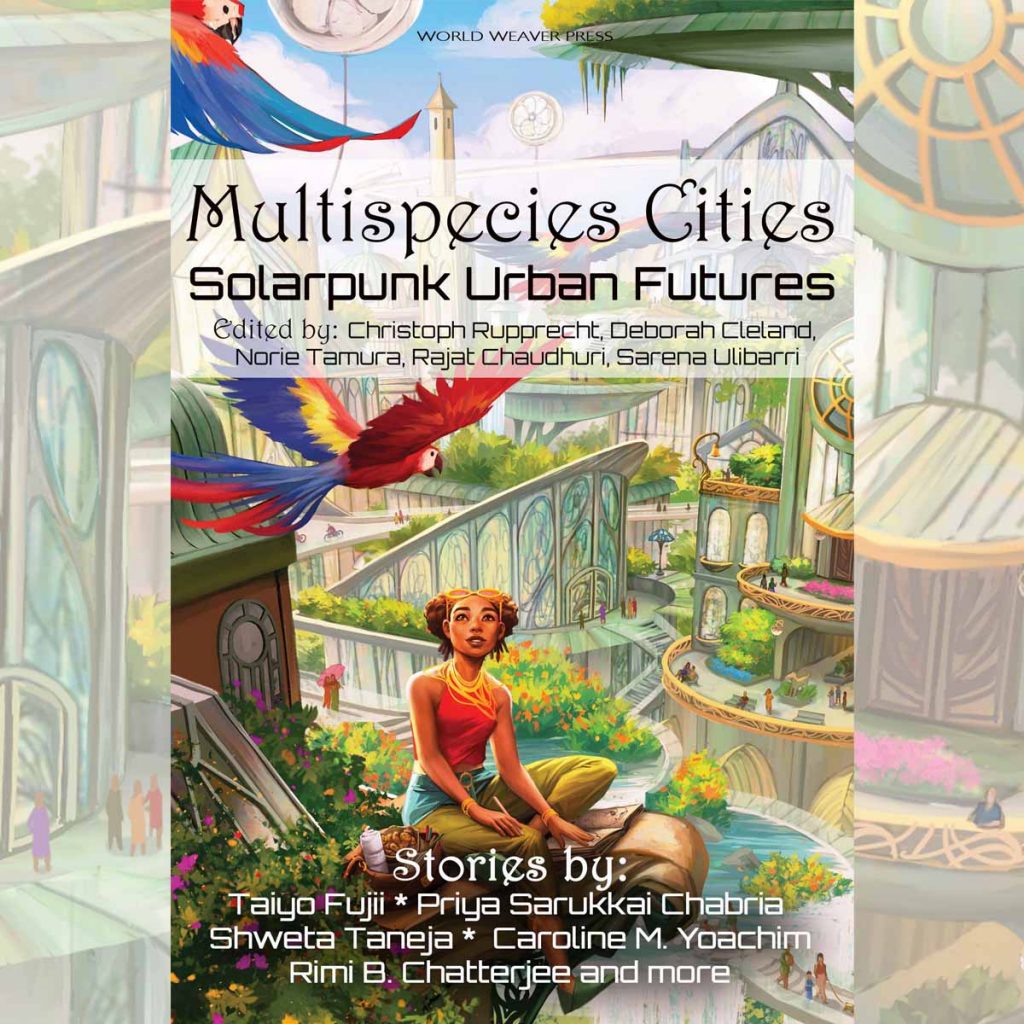What happens when dolphins take over the world? Create a technology that humans have no understanding of? I’m thrilled to announce the release of my new solarpunk tale, The Songs That Humanity Lost Reluctantly To Dolphins.
It’s part of an upcoming anthology on imagining an optimistic future by World Weaver Press, an independent publisher based in the USA. The anthology is called Multispecies Cities and is a collection of richly imagined tales by storytellers from the Asia-Pacific and beyond. Head to the Multispecies Cities page on the publisher website to find your favourite retailer.
Each story is on how future cities will look like, taking the positive route rather than the dystopian one that we SF writers so prefer.
Hope and science fiction?
That’s solarpunk for you. It’s positive, it’s optimistic and it’s quite hard to write in current times. When Rajat and Sarena the editors of Multispecies Cities approached me to write a story for this anthology, I sat with nothing for weeks. For I had not thought positively about the future in my SF writings. How could you, in the midst of a pandemic and a cagey nationalism wave?
Then one day, I sat on my desk, reimagining not only future cities, but science fiction as a genre that imagines these cities, I remembered how I keep wondering why science fiction imaginations of our future are so metallic and materialistic. They’re about wars and spaceships and human desires. There’s not much about other organisms (unless they’re evil aliens), though it’s a sub-genre that is now being explored.
Solarpunk the future!
I decided to reimagine future technology itself, make it organic in nature, make it something that was not created by humans or even understood by them but by another species on the planet – not an alien. A technology that will completely disrupt our metallic, materialistic way of life and replace it with something organic, like fungus or a song of empathy.
In a gist, that’s what The Songs That Humanity Lost Reluctantly To Dolphins is about. It explores what happens to us when an alternate lifestyle, that puts empathy first, erupts in future cities. When the children take to it, adapt to it, but us, adults, just cannot adapt. First we rage, then we bomb but our hearts break as fungus becomes one with our children and all the other species of the planet become one. When the next generation does not remain ours, what happens? We determinedly try to connect to the empathy songs that the dolphins have created.
This story itself is a sad song of change that is forced upon us. I suffered with helpless parents, with governments that could do nothing as their economies crashed. But this dramatic change transforms into a beautiful, new, positive future.
I wrote this story in a day, and I think that energy shows beautifully in the prose. It’s not my usual writing style, but I’m happy that this beautiful story happened. The story was also translated and published in French in the Galaxies SF magazine.
Solarpunk is here to stay

The cover is done by Vancouver based artist Rita Fei and I absolutely loved her work. Here’s the blurb, if you’re into those things:
Cities are alive, shared by humans and animals, insects and plants, landforms and machines. What might city ecosystems look like in the future if we strive for multispecies justice in our urban settings? In these more-than-human stories, twenty-four authors investigate humanity’s relationship with the rest of the natural world, placing characters in situations where humans have to look beyond their own needs and interests. A quirky eco-businessman sees broader applications for a high school science fair project.
A bad date in Hawai‘i takes an unexpected turn when the couple stumbles upon some confused sea turtle hatchlings. A genetically-enhanced supersoldier struggles to find new purpose in a peaceful Tokyo. A community service punishment in Singapore leads to unexpected friendships across age and species. A boy and a mammoth trek across Asia in search of kin. A Tamil child learns the language of the stars. Set primarily in the Asia-Pacific, these stories engage with the serious issues of justice, inclusion, and sustainability that affect the region, while offering optimistic visions of tomorrow’s urban spaces.
Doesn’t it sound yummy? You can order it as an ebook or a physical one across the world. Head to the Multispecies Cities page on the publisher website to find your favourite retailer.
Oh and in 2020, the short story, was translated by Thomas Bauduret and published in French in Galaxies 64, a prestigious French SF magazine. It’s called Les Chants que L’Humanité abandonna aux. So that was quite nice, but quickly forgotten as I never posted about it here.
Well, now you know. Till next time.


